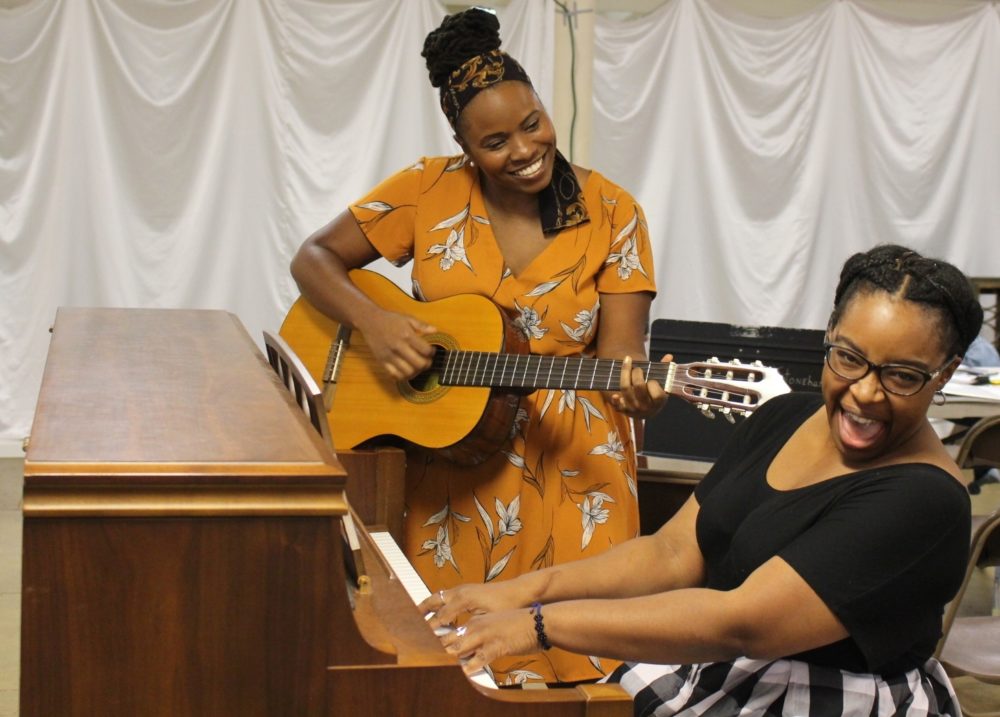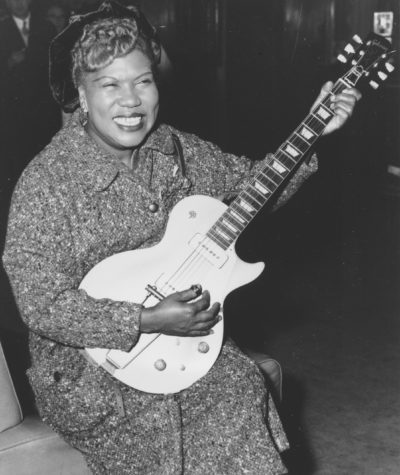Advertisement
Front Porch And GBSC Tell The Untold Story Of The Mother Of Rock 'N' Roll Rosetta Tharpe

When we think of the rock ‘n’ roll greats, the name Sister Rosetta Tharpe may not be the first name that pops into our heads. But as early as 1938, Tharpe’s vanguard voice and sparkplug showmanship set nightclub stages ablaze. In 1946, when she began touring with Marie Knight, she was playing to thousands of people at baseball stadiums. She set the stage for rock ‘n’ roll with her signature gospel sound and electric guitar. Yet by her death in 1973, her Cadillacs and fur coats were gone, and her name was largely forgotten, missing even from her grave.
It’s a story heard over and over again, of people of colors’ significant contributions to American culture dismissed, forgotten, or stolen in every medium from music to design to food. But at long last, we are learning Tharpe’s name. In 2011, the BBC created a documentary about her and, in 2018, she was finally inducted into the Rock & Roll Hall of Fame.
This season, Greater Boston Stage Company seeks to further spread Tharpe’s gospel. In collaboration with Front Porch Arts Collective, GBSC will stage the New England premiere of “Marie and Rosetta.” Written by George Brant in 2016, the play comes as part of a profound narrative shift in the way people all over the world understand how popular music came to be.
“What we talk about as American music, whether it’s jazz, blues, gospel, house, black people played an integral role in creating it. All of it evolved from Negro spirituals. It’s really important to understand that,” says Lovely Hoffman, who plays Tharpe in the production.
“Marie and Rosetta” is a musical set on the night of Tharpe and Knight's first rehearsal together. It is a historic night, when they decide to embark on a years-long international tour together, revolutionizing not just music, but the business of being a musician. “It really was entrepreneurship,” says Hoffman. “Tharpe was the first to have her own tour bus because they were not allowed to sleep in any hotels. Rosetta was on guitar, Marie was on piano, and they said, ‘We’re gonna do this thing together.’ They didn’t have to rely on anyone else.”

The story explores both women’s lives in all their vivid, breathtaking humanity. “ ‘Marie and Rosetta’ doesn’t just show Tharpe as this musical entity, but as a real woman, as a real person, and as a complex woman,” says director Pascale Florestal. “It is such a joyous celebration of these two women, their friendship, their love for one another. You get to see everything they go through that night, see their friendship grow, them fall for each other and create beautiful music. You get to sing with them, praise with them, clap with them, you get to really feel what it is to be these women, that’s what makes this show so great and so relevant.”
Tharpe and Knight did things back then that women of color get flak for even now, says Pier Lamia Porter, who plays Knight. “It’s just these two big personalities that just blazed, man,” she says.
No one could sing like Tharpe, no one could play guitar like her, and no one else could have created that unique mixture of gospel spiritual with rhythm and electric blues that was miraculously, singularly hers. Rock ‘n’ roll as we know it today would not exist without her.
Advertisement
“Her music being from the gospel tradition, it gives hope. It talks about overcoming and being lightbearers and being the change you want to see,” says music director Erica Telisnor.
For Florestal especially, remembering Rosetta “shows young women of color what they’re worthy of and what they can aspire to. I hope other POC artists can see this show and think, ‘Oh, I can be the next Rosetta Tharpe. I can pick up a guitar and pave the way for the next era of music because someone else was able to do it in the beginning.’ ”
"Marie and Rosetta" runs from Oct. 17 to Nov. 10.